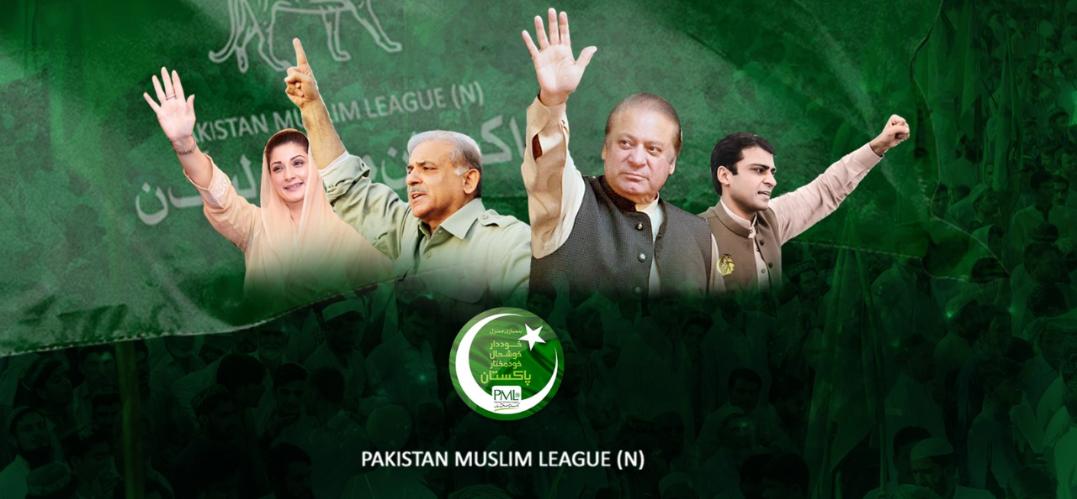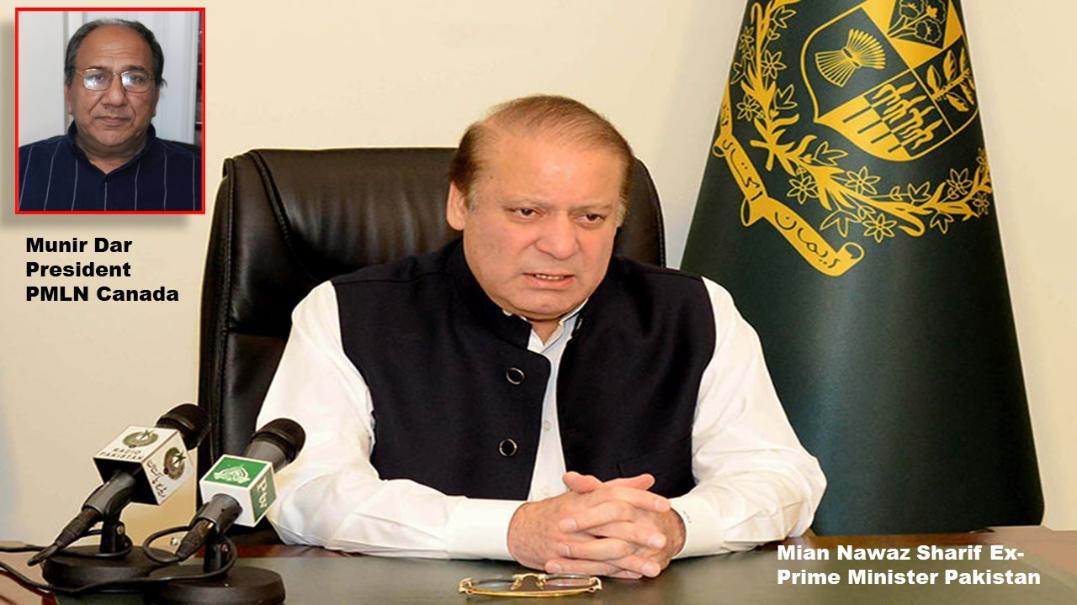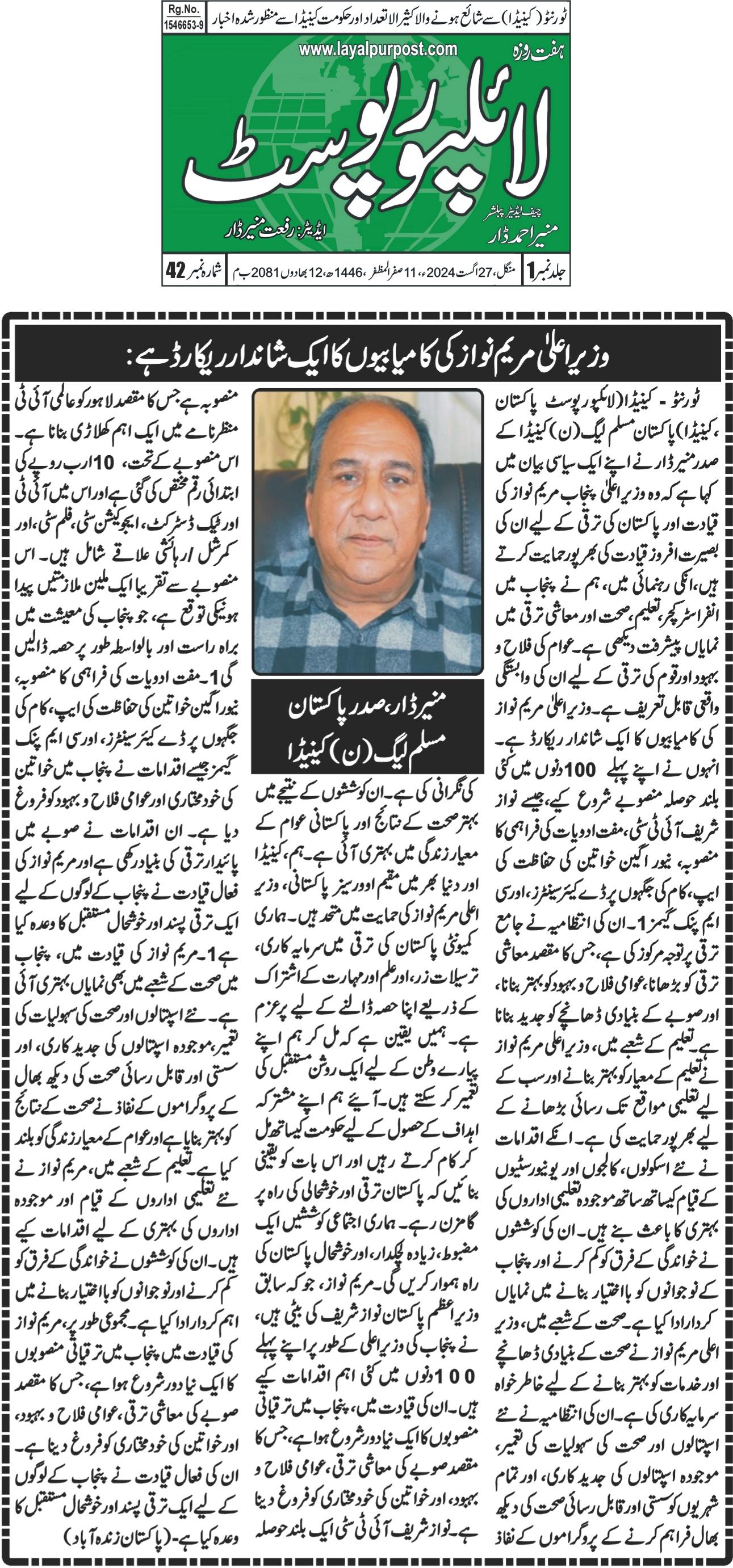PAKISTAN MUSLIM LEAGUE (N) ROLE IN THE ECONOMIC GROWTH OF PAKISTAN: MUNIR DAR
MUNIR DAR PRESIDENT PAKISTAN MUSLIM LEAGUE (N) CANADA

The Pakistan Muslim League-Nawaz (PMLN) has played a significant role in the economic growth of Pakistan, particularly during its tenure from 2013 to 2018. Here are some key highlights of their contributions:
Economy
Achieved Resounding Growth Without Inflation
- Maintained around 5% economic growth, peaking at 5.79% in 2018.
- Expanded the economy by over 50%, from Rs. 22,385B to Rs. 34,396B.
- Reduced the budget deficit from 8.2% of GDP in 2012-13 to 4.6% in 2015-16.
- Kept average inflation below 4%.
Unleashed Development
- Became the 8th fastest-growing nation in exports.
- Increased industrial growth from 1.2% to 5.13%.
- Boosted development spending from Rs. 1.3T to Rs. 3T.
- Tripled BISP funding from Rs. 40B to Rs. 115B.
- Grew the large-scale manufacturing sector from 0.32% to 4.2%.
- Increased services sector growth from 3.6% to 5.1%.
- Raised the number of companies incorporated per year from 3,900 to 8,500.
- Increased foreign remittances from $13.9B to approximately $20B.
- Doubled the capital invested in the Pakistan Stock Exchange.
Attracted Investments for Infrastructure
- Initiated power and infrastructure projects worth $223B in the last five years, compared to $140B during 2008-13.
- Launched CPEC projects with an investment of $60B, with $30B worth of projects already initiated.
Improved Efficiency of State-Owned Enterprises
- Set up 1,000 km of the South-North pipeline and established two LNG regasification terminals in record time.
- Achieved record profits in OGDC and PPL from oil exploration.
- Liquidated shares of UBL, HBL, and PPL to the private sector, with UBL and HBL rated as Best Equity Transactions in Asia for 2014 and 2015.
Enhanced Access to Credit
- Increased average private sector credit from Rs. 96B to Rs. 457B.
- Boosted agriculture credit by 200%.
- Developed the National Financial Inclusion Strategy (NFIS) for the poor, improving access to finance for micro, small, and rural enterprises.
- Enacted the Credit Bureau Act and Secured Transaction Act to establish a moveable assets collateral registry, enabling SMEs to obtain credit against their moveable assets.
Poverty Alleviation
Protected the Poor
- Expanded the BISP unconditional cash transfer program for women living in extreme poverty from approximately 3.2 million to 5.5 million households.
- Increased BISP funding from Rs. 40B to Rs. 115B.
- Provided comprehensive coverage against catastrophic illnesses to over 3 million people across 44 districts under the Prime Minister National Health Program.
- Granted Rs. 2,000 per month to over 90,000 people with disabilities under the Khidmat Card program.
Mainstreamed the Vulnerable
- Enrolled 2 million BISP beneficiary children in schools through a stipend program across 50 districts.
- Provided 500,000 school girls with a stipend of Rs. 1,000/month in 16 Punjab districts through the Khadim-e-Punjab Zevar-e-Taleem Program.
- Granted PEEF scholarships to about 350,000 students through an endowment fund of Rs. 17B.
- Disbursed Rs. 45B in small loans to over 2 million families through the Chief Minister of Punjab’s Self-Employment Scheme.
- Disbursed PKR 10B in interest-free loans to about 450,000 poor beneficiaries.
- Transferred cash stipends to 90,000 children working in brick kilns, conditional upon school attendance.
- Established Sheher-e-Khamoshan graveyards in major cities of Pakistan.
Tax Reforms
Initiated Unprecedented Tax Reforms
- Doubled revenue collection of the Federal Board of Revenue (FBR) from Rs. 1.9T to approximately Rs. 3.9T.
- Raised the tax-to-GDP ratio from 9% to 13%.
- Expanded the tax base from 700,000 to 1.4M filers.
- Introduced an asset declaration scheme, leading to benefits in foreign reserves increase, tax revenue generation, documentation of assets, and broadening of the tax base.
- Signed a multilateral convention to tackle tax evasion.
- Eliminated the SRO culture by transferring power from the Federal Government to the Parliament.
- Decreased the maximum individual tax rate from 30% to 15%.
- Increased the minimum tax threshold from Rs. 0.4M to Rs. 1.2M per year.
- Decreased the corporate tax rate from 35% to 30%.
- Enacted the Prohibition of Benami Transaction law.
- Adopted the CNIC number as the NTN number.
- Published a parliamentarian and taxpayer directory.
- Enabled the payment of taxes online, through cell phones and ATMs, via any bank in the country.
- Strengthened the Alternate Dispute Resolution (ADR) mechanism by making decisions binding on both parties.
- Established a Queue Management System to eliminate the discretionary system for sales tax refunds.
CPEC Game Changer
Generated Employment
- Focused CPEC on labour-intensive schemes requiring civil works and construction, such as power projects, ports, and highway infrastructure.
- Created tens of thousands of medium to low-skilled jobs for indigenous labour.
- Enhanced labour skills through vocational training.
Built Development Infrastructure
- Implemented a subset of 23 projects worth over $27B in energy, infrastructure, and communication.
- Started 15 projects worth over $19B in the energy sector and road/highway infrastructure, scheduled for completion in 2019.
- Completed multibillion-dollar power plants such as Port Qasim and Sahiwal coal-fired plants in record time.
Refocused Economic Growth in Less Developed Areas
- Developed CPEC projects in less developed areas, such as Gwadar East Bay Expressway, New Gwadar Airport, Bostan Industrial Zone, and Gwadar University.
- Invested in mining and power projects in Thar.
- Inaugurated an optical fibre infrastructure project between Khunjerab Pass and Rawalpindi.
- Developed a network of highways and motorways along the Eastern and Western alignments.
- Kicked off trade activities along the corridor, such as the first trade caravan containing over 100 Chinese containers transiting from Sust port to Gwadar port.
Agriculture
Revived Agriculture Sector Growth
- Expanded the agriculture economy by 3.8% during 2017-18, the highest in the past 13 years.
- Provided a Kissan Package of Rs. 341B, including direct cash transfers of Rs. 32B to 1.6M farmers, power subsidy of Rs. 12B through tariff reduction, massive subsidies on fertilizers, tax relief on the import and sale of farm machinery, and increased agriculture credit to farmers with small landholdings.
Encouraged Research-Based Interventions
- Upgraded research institutes, equipped labs, and allocated resources for demand-driven research.
- Adopted evidence-based initiatives on olive cultivation, water use efficiency, agricultural education, and the use of ICT to improve food security.
Supported Small Farmers
- Increased yield and productivity by providing 7,000 laser levelers and 110,000 mobile phones to enhance the effectiveness of agricultural practices through farmer education.
- Covered 43,388 acres of land with high-efficiency irrigation systems such as drip irrigation and sprinkler systems.
- Established 9,000 medical kit-mounted motorcycles, 347 mobile veterinary dispensaries, 44 mobile veterinary laboratories, and 9 mobile training schools to support the health and well-being of subsistence livestock in 26,000 villages of Punjab.
Increased Access to Agriculture Credit
- Increased agriculture credit disbursement from Rs. 336B to around Rs. 1,000B.
- Created a database of 8M livestock farmers in Punjab and linked them to branchless banking products with regulatory and compliance support from SBP.
Strengthened Legislative and Policy Framework
- Amended the Seed Act 1976 and introduced the Plant Breeders Right Act to enhance crop variety.
- Developed the first-ever National Food Security Policy.
Technology
Supported the IT Industry
- Launched the National Digital Policy 2018 and the Punjab IT Policy 2018.
- Extended the IT export tax holiday till 2025.
- Provided a 5% cash reward on IT exports.
- Reduced sales tax on IT-enabled services to 5% within federal areas.
The Role of Nawaz Sharif in the Development of Pakistan- From Inception to 2024: Munir Dar

Introduction
Nawaz Sharif, a prominent figure in Pakistani politics, has played a significant role in shaping the country’s development over the past few decades. Serving as Prime Minister in three non-consecutive terms (1990-1993, 1997-1999, and 2013-2017), his leadership has been marked by economic reforms, infrastructure development, and political challenges.
Early Political Career
Nawaz Sharif began his political journey in the 1980s, initially serving as the Finance Minister of Punjab and later as the Chief Minister of Punjab1. His early political career was characterized by efforts to modernize the province’s infrastructure and economy.
First Term as Prime Minister (1990-1993)
During his first term, Nawaz Sharif launched an ambitious economic reform program aimed at privatizing state-owned enterprises and liberalizing the economy1. His government faced significant challenges, including tensions with India over the Kashmir conflict and balancing relations with the Islamic right wing and social democrats1.
Second Term as Prime Minister (1997-1999)
In his second term, Nawaz Sharif focused on reducing the powers of the president and the military, leading to a constitutional crisis1. His government implemented a series of economic measures in collaboration with the International Monetary Fund (IMF) to stabilize the economy and reduce fiscal deficits2. However, his tenure was cut short by a military coup in 1999, leading to his exile in Saudi Arabia1.
Third Term as Prime Minister (2013-2017)
Nawaz Sharif’s third term saw significant economic improvements, with higher growth rates, a stable rupee, and lower inflation3. His government also focused on infrastructure development, including the China-Pakistan Economic Corridor (CPEC), which brought substantial investment from China3. Despite these achievements, his term was marred by allegations of corruption, leading to his disqualification from public office in 20171.
Return to Politics and Current Role (2024)
After his convictions were overturned in late 2023, Nawaz Sharif returned to the National Assembly in 20241. His return has been marked by renewed enthusiasm among his supporters and a focus on continuing Pakistan’s development journey4.
Conclusion
Nawaz Sharif’s role in the development of Pakistan has been multifaceted, encompassing economic reforms, infrastructure development, and political challenges. His leadership has left a lasting impact on the country’s trajectory, and his return to politics in 2024 signals a continued influence on Pakistan’s future.

